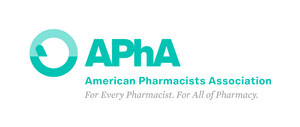WASHINGTON, Jan. 31, 2020 /PRNewswire/ -- In a New York Times article today about patients and medication errors, pharmacists describe being stressed about workplace conditions that may lead to mistakes impacting patient safety. The article identifies medication errors, metrics, long hours in the workplace, payment policies, and problems with high quantity dispensing to at-risk patients. Patient safety and appropriate medication use are foundational elements in the care pharmacists provide, yet current pressures in the health care system challenge pharmacists' abilities to deliver the care patients deserve.
The American Pharmacists Association (APhA) recognizes numerous system factors jeopardize the delivery of patientcare. Today's health care system puts unreasonable limitations on staffing and time pharmacists can spend with patients at the point of dispensing. These limitations compromise focus on patients and the well-being of pharmacists and pharmacy-personnel. A major contributor to these issues is Pharmacy Benefit Managers' (PBM) precipitous reduction in coverage and reimbursement for patient care. As such, APhA is addressing pharmacists' ability to best serve patients while addressing pharmacists' well-being.
"Pharmacists by nature are caring and compassionate," said APhA Executive Vice President and CEO Thomas E. Menighan, BSPharm, MBA, ScD (Hon), FAPhA. "The increasing burdens placed upon them are obstacles to their efforts to meet patient care needs and improve outcomes. Our call to action is for systemic payment reform by payers and policy makers. Employers must also open safe, non-retaliatory dialogue on how to address immediate pharmacist pressures and then make appropriate changes. Addressing these key stressors will lower patient exposure to preventable medication errors. Improving the systems for care delivery is a priority for all pharmacy stakeholders, not just APhA."
APhA advocates for consumer access to and compensation for pharmacist-provided quality patient care services through provider status legislation at the federal and state levels. Numerous studies demonstrate the positive impact on patient outcomes when pharmacists are actively engaged in medication and health management activities. In addition, APhA is supporting regulation of PBMs that will be addressed in the upcoming review by the US Supreme Court (Rutledge v. PCMA) regarding the rights of states to regulate PBMs and their business practices.
APhA is engaged in a multifaceted and collaborative effort with stakeholders across the profession including organizations at the state and national levels, employers, schools and colleges of pharmacy, policy-makers, and other stakeholders aimed at addressing PBM practices that interfere with the delivery and access to pharmacist-provided patient care, practice management, inappropriate metrics and patient safety.
In July 2019, APhA, along with four (4) other national pharmacy associations conducted the Enhancing Well-Being and Resilience Among the Pharmacist Workforce: A National Consensus Conference. The consensus conference led to a total of 50 actionable recommendations designed to immediately address improving pharmacist work conditions and patient safety; payment models; relations between pharmacists and employers; and other contributing factors.
The Pharmacists' Well-Being Index is an is an anonymous online survey tool that periodically assesses pharmacists' distress levels. The survey is being conducted with thousands of pharmacists in collaboration with Mayo Clinic. APhA will lead forums this year to address pharmacists' risk factors and will increase its educational offerings on self-awareness of burnout. The goal is to empower individual pharmacists and to reduce the negative impact stress has on patient care. We will continue to facilitate policy changes that address patient safety issues and recognize pharmacists as the medication expert in team-based, patient centered care.
About the American Pharmacists Association
The American Pharmacists Association, founded in 1852 as the American Pharmaceutical Association, is a 501 (c)(6) organization, representing 60,000 practicing pharmacists, pharmaceutical scientists, student pharmacists, pharmacy technicians and others interested in advancing the profession. APhA is dedicated to helping all pharmacists improve medication use and advance patient care and is the first and largest association of pharmacists in the United States. For more information, please visit www.pharmacist.com.
SOURCE American Pharmacists Association

Related Links
WANT YOUR COMPANY'S NEWS FEATURED ON PRNEWSWIRE.COM?
Newsrooms &
Influencers
Digital Media
Outlets
Journalists
Opted In






Share this article